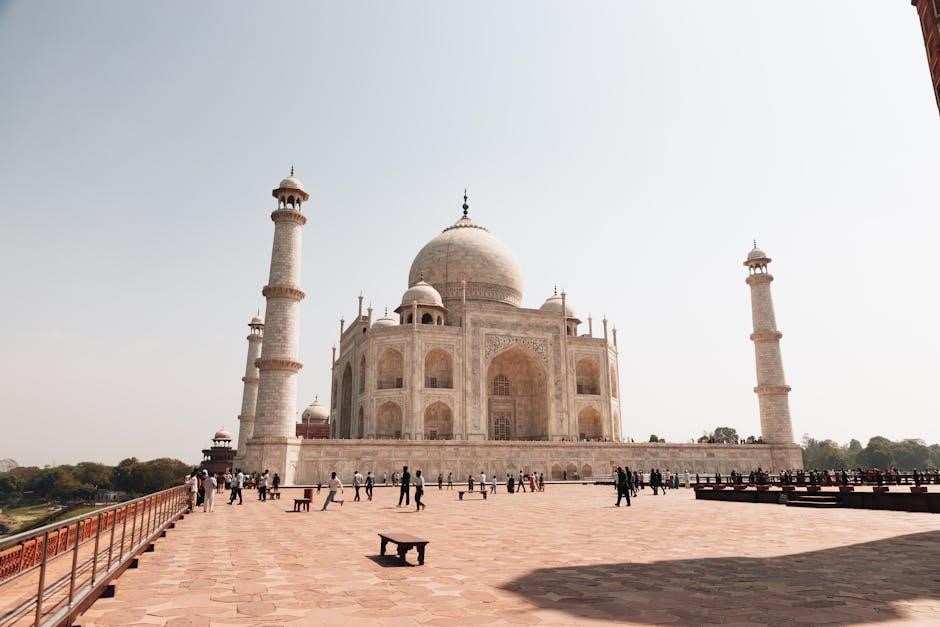James Ijames’ Kill Move Paradise delivers a powerful critique of systemic injustice through four Black men trapped in an afterlife waiting room, blending poetic expression with urgent social commentary.
Overview of the Play
Kill Move Paradise, written by James Ijames, is a poignant and expressionistic play that delves into the lives of four Black men who find themselves in a limbo-like space after their deaths. The play examines themes of systemic violence, injustice, and the afterlife, blending poetic dialogue with raw emotion. Through their interactions, the characters grapple with their identities and the circumstances that led to their deaths, challenging the audience to confront the harsh realities of racial inequality. The play’s unique structure and powerful messaging create a space for reflection and dialogue, making it a critical work in contemporary theater addressing urgent social issues.
Relevance of the Topic in Contemporary Society
Kill Move Paradise resonates deeply in today’s society, addressing systemic racism and police violence against Black individuals. Its exploration of injustice and the devaluation of Black lives aligns with the Black Lives Matter movement and ongoing conversations about racial equality. The play’s unflinching portrayal of these issues sparks necessary dialogue, making it a vital work in contemporary theater. By highlighting the human cost of systemic oppression, it challenges audiences to confront uncomfortable truths, fostering empathy and urgency for change. Its relevance is amplified by its accessibility through live-stream productions, ensuring its message reaches a broader audience in an increasingly digital world.

Background of the Playwright: James Ijames
James Ijames is a Philadelphia-based playwright and actor known for his bold, socially charged works like Kill Move Paradise and the Pulitzer Prize-winning Fat Ham.
Biography of James Ijames
James Ijames is a Philadelphia-based playwright, actor, and educator whose work explores themes of race, identity, and social justice. Known for his bold and unflinching narratives, Ijames gained prominence with plays like Kill Move Paradise and Fat Ham, the latter earning him the Pulitzer Prize for Drama. His writing often blends lyricism with sharp critique, addressing systemic inequities and the resilience of marginalized communities. Ijames is also associated with several theater companies, including the Wilma Theater and InterAct Theatre Company, where he contributes to the development of innovative and socially relevant performances. His work has solidified his reputation as a vital voice in contemporary American theater.
His Contributions to Contemporary Theater
James Ijames has made significant contributions to contemporary theater through his innovative and provocative works. His play Kill Move Paradise stands out for its unflinching examination of systemic injustice and its exploration of the Black experience. By blending poetic language with sharp social critique, Ijames challenges audiences to confront uncomfortable truths about race and violence. His work has been praised for its originality and its ability to spark necessary conversations. Through his writing, Ijames not only reflects the struggles of marginalized communities but also offers a powerful vision of resilience and hope. His contributions have earned him recognition as a leading voice in American theater today.


Plot Summary of “Kill Move Paradise”
Kill Move Paradise follows four Black men—Isa, Daz, Grif, and Tiny—trapped in a liminal afterlife waiting room, grappling with their deaths at the hands of police violence and systemic injustice.
Setting and Structure of the Play
The play unfolds in a strange, open space resembling a cosmic waiting room, where time and space blur. This abstract setting reflects the characters’ liminal existence. The structure is expressionistic, with poetic dialogue and fragmented scenes that mirror the chaos of their deaths; Minimal props and symbolic elements, like shadows and light, create a haunting atmosphere. The non-linear narrative jumps between memories and existential debates, emphasizing the characters’ emotional journeys. This unconventional format amplifies the play’s themes of injustice and the search for meaning in the afterlife, making it a powerful commentary on systemic violence and the Black experience.
Character Analysis: Isa, Daz, Grif, and Tiny
Isa, Daz, Grif, and Tiny are four Black men trapped in a cosmic waiting room, each embodying unique dimensions of humanity and resilience. Isa, introspective and philosophical, grapples with existential questions, guiding the narrative with emotional depth. Daz, hot-headed and confrontational, channels his anger and frustration, mirroring the resistance against systemic racism. Grif, quiet and reserved, hides his pain beneath a calm exterior, reflecting the weariness of marginalization. Tiny, with his tough yet vulnerable demeanor, showcases the complexity of strength and sensitivity. Together, they represent the multifaceted impact of injustice, their stories weaving a powerful tapestry of grief, defiance, and the quest for justice.

Themes and Symbolism
Kill Move Paradise explores themes of systemic racism, police violence, and the afterlife, using a liminal waiting room as a metaphor for displacement and justice. The play symbolizes the search for healing and truth in a society grappling with inequality.
Exploration of Social Justice Issues
Kill Move Paradise delivers an unflinching examination of systemic racism and police violence, offering a haunting critique of the dehumanization of Black lives. The play centers on four Black men trapped in a surreal afterlife, their deaths at the hands of police sparking a powerful exploration of injustice. Through their struggles, Ijames confronts the myth of equality, exposing the failures of a society that perpetuates violence against marginalized communities. The work provokes both grief and outrage, challenging audiences to confront the realities of racial oppression and the ongoing struggle for justice. It resonates deeply with the Black Lives Matter movement, underscoring the urgent need for change.
The Concept of Paradise and the Afterlife
Kill Move Paradise reimagines the afterlife as a surreal, liminal space where four Black men find themselves trapped after their deaths. This cosmic waiting room serves as a stark contrast to the idyllic paradise often envisioned, instead becoming a place of reckoning and questioning. The play subverts traditional notions of an afterlife, presenting it as a space of isolation and ambiguity rather than peace or resolution. Through this setting, Ijames critiques the idea of a perfect paradise, highlighting how it fails to account for the traumas and injustices experienced by marginalized communities; The afterlife becomes a metaphor for the limbo of systemic oppression.
The play’s portrayal of paradise as incomplete and unfulfilling reflects the characters’ unresolved struggles, emphasizing that true justice and peace cannot be attained in a world that devalues Black lives. This inversion of the afterlife challenges audiences to reconsider their understanding of justice, both in the mortal world and beyond.

Production and Performance History
Kill Move Paradise was first performed live in Bushnell Park, Hartford, and later streamed online from July 7 to August 1. Directed by Dexter J. Singleton, it gained significant attention for its bold staging and timely message. The play was also produced by Victory Gardens Theater as part of the IGNITION Festival of New Plays in 2016, marking its initial development; Its live-stream production in February and March 2021 further expanded its reach during the pandemic, solidifying its impact on contemporary theater.
Initial Staging and Reception
Directed by Dexter J. Singleton, Kill Move Paradise premiered live in Bushnell Park, Hartford, for three days. Its expressionistic style and bold staging garnered immediate attention, resonating deeply with audiences. The play’s initial reception highlighted its unflinching portrayal of systemic injustice, drawing praise for its raw emotional power. As part of the IGNITION Festival of New Plays in 2016, it marked a significant moment in contemporary theater, establishing James Ijames as a voice for urgent social commentary. The live performances set the tone for its future success, solidifying its reputation as a groundbreaking work addressing racial injustice and police violence.
Live-Stream Productions and Their Impact
The live-stream production of Kill Move Paradise in 2021 expanded its reach, allowing global audiences to engage with its powerful narrative. Streamed from February 26 to March 6, the play’s digital format made it accessible during the pandemic, sparking crucial conversations online. The University of Indianapolis’ production highlighted the adaptability of the play, maintaining its emotional intensity even in a virtual setting. This format not only preserved the play’s urgency but also introduced it to new audiences, further amplifying its message of social justice and racial equity. The success of the live-stream underscored the enduring relevance of the play’s themes.

Critical Reception and Reviews
Kill Move Paradise has garnered critical acclaim for its unflinching portrayal of racial injustice and innovative storytelling. Reviewers praise its powerful dialogue and emotional depth, calling it a vital contribution to contemporary theater.
Analysis of Audience and Critical Responses
Audiences and critics have responded strongly to Kill Move Paradise, praising its bold narrative and emotional resonance. Many highlight its ability to provoke necessary conversations about race and justice. While some find the play’s intense themes challenging, others applaud its unflinching honesty. The expressionistic style has drawn particular attention, with reviewers noting its effectiveness in conveying the characters’ existential struggles. Overall, the play has been celebrated for its thought-provoking nature and its contribution to the discourse on systemic inequality.
Comparison with Other Works by James Ijames

James Ijames’ Kill Move Paradise stands out alongside his other works, such as the Pulitzer Prize-winning Fat Ham, for its distinct tone and style. While Fat Ham blends humor and tragedy in a reimagined Shakespearean setting, Kill Move Paradise delivers a more direct, unflinching critique of systemic racism and police violence. Both works, however, share Ijames’ signature exploration of Black identity and justice. The expressionistic style of Kill Move Paradise contrasts with the more traditional narrative of Fat Ham, showcasing Ijames’ versatility as a playwright. Together, these works highlight his ability to address urgent social issues through innovative storytelling, cementing his influence in contemporary theater.

Historical and Cultural Context
Kill Move Paradise reflects the Black Lives Matter movement, addressing systemic racism and police violence. Its afterlife setting mirrors historical struggles for justice and equality in America.

Representation of Black Lives in Theater
Kill Move Paradise offers a raw, unfiltered portrayal of Black lives, challenging stereotypes and amplifying voices often marginalized in traditional theater. By centering four Black men in a surreal afterlife, the play confronts systemic racism and police violence, providing a platform for their stories. Its expressionistic style breaks from conventional narratives, emphasizing the urgency of their experiences. This work not only reflects the Black Lives Matter movement but also contributes to a growing canon of theater that prioritizes Black perspectives. Through its bold storytelling, Kill Move Paradise demands accountability and sparks crucial conversations about justice, identity, and humanity.
Parallel Themes in Greek Mythology and Modern Society
Kill Move Paradise draws parallels between Greek mythology and modern societal issues, reimagining the Elysium concept as a space where justice and humanity are questioned; The play’s limbo-like setting mirrors the ancient Greek notion of a post-mortem realm, where souls await judgment. However, Ijames flips this narrative by focusing on the unjust deaths of Black men, highlighting systemic racism. This reinterpretation connects timeless mythological themes with contemporary struggles, emphasizing the ongoing fight for justice and equality. By blending the ancient with the modern, the play underscores the universal and enduring nature of these issues, sparking reflections on how little societal progress has been made.
Kill Move Paradise leaves a profound impact, challenging audiences to confront systemic injustice and imagine a world where Black lives are valued. Its timely message endures;
The Lasting Impact of “Kill Move Paradise”
Kill Move Paradise has left an indelible mark on contemporary theater, sparking crucial conversations about race, violence, and justice. Its unflinching portrayal of systemic injustice resonates deeply, challenging audiences to confront uncomfortable truths. The play’s expressionistic style and poignant dialogue have evoked strong emotional and intellectual responses, making it a catalyst for change. By centering the voices of Black men navigating the afterlife, it humanizes their stories and demands accountability. The play’s ability to transcend traditional theater boundaries through live-stream productions has expanded its reach, ensuring its message continues to inspire reflection and action. Its relevance endures, solidifying its place in the canon of socially conscious art.
Future Prospects for the Play
Kill Move Paradise holds immense potential for future adaptations and educational integration. Its universal themes of justice and identity make it a prime candidate for film or television adaptation, expanding its audience. Schools and universities may adopt it as a text for discussing social justice, fostering dialogue. The play’s innovative style could inspire new works, influencing playwrights to address similar issues. With its growing recognition, it may see international productions, broadening its cultural impact. As a teaching tool, it could enhance curricula, encouraging empathy and critical thinking. Its relevance ensures it will remain a vital work, continuing to provoke and inspire future generations.
